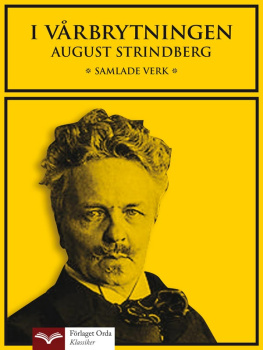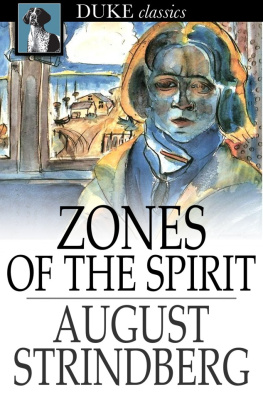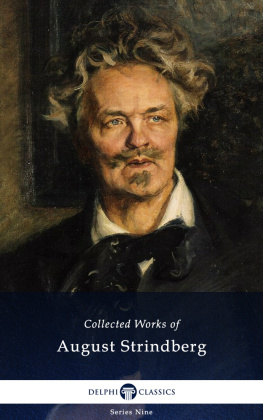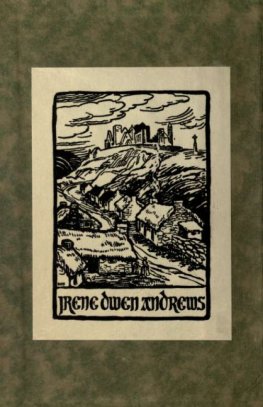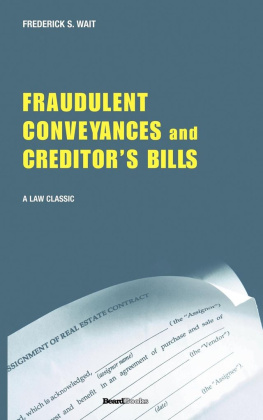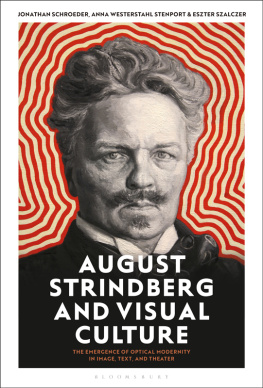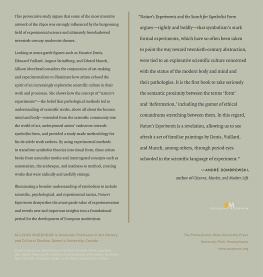August Strindberg - Creditors
Here you can read online August Strindberg - Creditors full text of the book (entire story) in english for free. Download pdf and epub, get meaning, cover and reviews about this ebook. year: 2013, genre: Adventure. Description of the work, (preface) as well as reviews are available. Best literature library LitArk.com created for fans of good reading and offers a wide selection of genres:
Romance novel
Science fiction
Adventure
Detective
Science
History
Home and family
Prose
Art
Politics
Computer
Non-fiction
Religion
Business
Children
Humor
Choose a favorite category and find really read worthwhile books. Enjoy immersion in the world of imagination, feel the emotions of the characters or learn something new for yourself, make an fascinating discovery.
- Book:Creditors
- Author:
- Genre:
- Year:2013
- Rating:4 / 5
- Favourites:Add to favourites
- Your mark:
- 80
- 1
- 2
- 3
- 4
- 5
Creditors: summary, description and annotation
We offer to read an annotation, description, summary or preface (depends on what the author of the book "Creditors" wrote himself). If you haven't found the necessary information about the book — write in the comments, we will try to find it.
Creditors — read online for free the complete book (whole text) full work
Below is the text of the book, divided by pages. System saving the place of the last page read, allows you to conveniently read the book "Creditors" online for free, without having to search again every time where you left off. Put a bookmark, and you can go to the page where you finished reading at any time.
Font size:
Interval:
Bookmark:
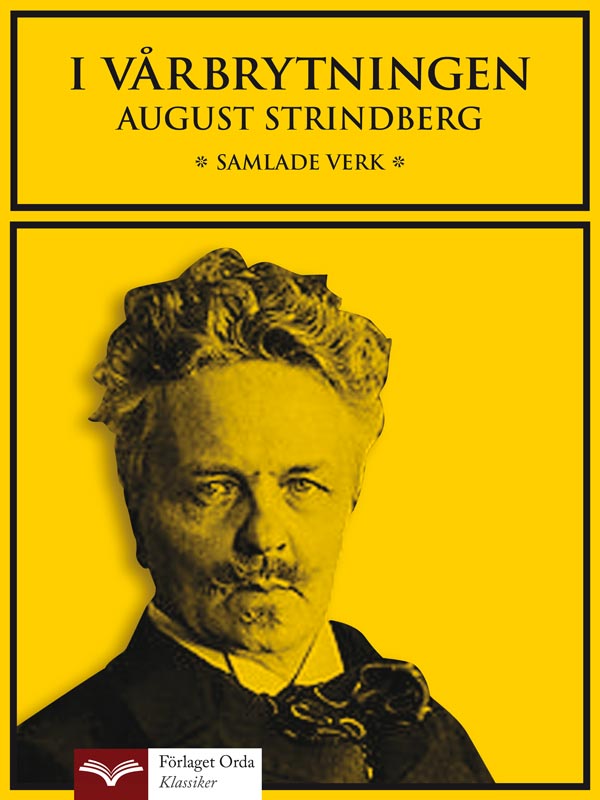 AUGUST STRINDBERG CREDITORS Frlaget Orda ISBN 978-91-7553-047-5 Fodringsgare Translation Edwin Bjorman Omslag Jrgen Hansen I INTRODUCTION This is one of the three plays which Strindberg placed at the head of his dramatic production during the middle ultra-naturalistic period, the other two being "The Father" and "Miss Julia." It is, in many ways, one of the strongest he ever produced. Its rarely excelled unity of construction, its tremendous dramatic tension, and its wonderful psychological analysis combine to make it a masterpiece. In Swedish its name is "Fordringsagare." This indefinite form may be either singular or plural, but it is rarely used except as a plural. And the play itself makes it perfectly clear that the proper translation of its title is "Creditors," for under this aspect appear both the former and the present husband of Tekla. One of the main objects of the play is to reveal her indebtedness first to one and then to the other of these men, while all the time she is posing as a person of original gifts. I have little doubt that Strindberg, at the time he wrote this play--and bear in mind that this happened only a year before he finally decided to free himself from an impossible marriage by an appeal to the law--believed Tekla to be fairly representative of womanhood in general.
AUGUST STRINDBERG CREDITORS Frlaget Orda ISBN 978-91-7553-047-5 Fodringsgare Translation Edwin Bjorman Omslag Jrgen Hansen I INTRODUCTION This is one of the three plays which Strindberg placed at the head of his dramatic production during the middle ultra-naturalistic period, the other two being "The Father" and "Miss Julia." It is, in many ways, one of the strongest he ever produced. Its rarely excelled unity of construction, its tremendous dramatic tension, and its wonderful psychological analysis combine to make it a masterpiece. In Swedish its name is "Fordringsagare." This indefinite form may be either singular or plural, but it is rarely used except as a plural. And the play itself makes it perfectly clear that the proper translation of its title is "Creditors," for under this aspect appear both the former and the present husband of Tekla. One of the main objects of the play is to reveal her indebtedness first to one and then to the other of these men, while all the time she is posing as a person of original gifts. I have little doubt that Strindberg, at the time he wrote this play--and bear in mind that this happened only a year before he finally decided to free himself from an impossible marriage by an appeal to the law--believed Tekla to be fairly representative of womanhood in general.
The utter unreasonableness of such a view need hardly be pointed out, and I shall waste no time on it. A question more worthy of discussion is whether the figure of Tekla be true to life merely as the picture of a personality--as one out of numerous imaginable variations on a type decided not by sex but by faculties and qualities. And the same question may well be raised in regard to the two men, both of whom are evidently intended to win our sympathy: one as the victim of a fate stronger than himself, and the other as the conqueror of adverse and humiliating circumstances. Personally, I am inclined to doubt whether a Tekla can be found in the flesh--and even if found, she might seem too exceptional to gain acceptance as a real individuality. It must be remembered, however, that, in spite of his avowed realism, Strindberg did not draw his men and women in the spirit generally designated as impressionistic; that is, with the idea that they might step straight from his pages into life and there win recognition as human beings of familiar aspect. His realism is always mixed with idealism; his figures are always "doctored," so to speak.
And they have been thus treated in order to enable their creator to drive home the particular truth he is just then concerned with. Consciously or unconsciously he sought to produce what may be designated as "pure cultures" of certain human qualities. But these he took great pains to arrange in their proper psychological settings, for mental and moral qualities, like everything else, run in groups that are more or less harmonious, if not exactly homogeneous. The man with a single quality, like Moliere's Harpagon, was much too primitive and crude for Strindberg's art, as he himself rightly asserted in his preface to "Miss Julia." When he wanted to draw the genius of greed, so to speak, he did it by setting it in the midst of related qualities of a kind most likely to be attracted by it. Tekla is such a "pure culture" of a group of naturally correlated mental and moral qualities and functions and tendencies--of a personality built up logically around a dominant central note. There are within all of us many personalities, some of which remain for ever potentialities.
But it is conceivable that any one of them, under circumstances different from those in which we have been living, might have developed into its severely logical consequence--or, if you please, into a human being that would be held abnormal if actually encountered. This is exactly what Strindberg seems to have done time and again, both in his middle and final periods, in his novels as well as in his plays. In all of us a Tekla, an Adolph, a Gustav--or a Jean and a Miss Julia--lie more or less dormant. And if we search our souls unsparingly, I fear the result can only be an admission that--had the needed set of circumstances been provided--we might have come unpleasantly close to one of those Strindbergian creatures which we are now inclined to reject as unhuman. Here we have the secret of what I believe to be the great Swedish dramatist's strongest hold on our interest. How could it otherwise happen that so many critics, of such widely differing temperaments, have recorded identical feelings as springing from a study of his work: on one side an active resentment, a keen unwillingness to be interested; on the other, an attraction that would not be denied in spite of resolute resistance to it! For Strindberg DOES hold us, even when we regret his power of doing so.
And no one familiar with the conclusions of modern psychology could imagine such a paradox possible did not the object of our sorely divided feelings provide us with something that our minds instinctively recognise as true to life in some way, and for that reason valuable to the art of living. There are so many ways of presenting truth. Strindberg's is only one of them--and not the one commonly employed nowadays. Its main fault lies perhaps in being too intellectual, too abstract. For while Strindberg was intensely emotional, and while this fact colours all his writings, he could only express himself through his reason. An emotion that would move another man to murder would precipitate Strindberg into merciless analysis of his own or somebody else's mental and moral make-up.
At any rate, I do not proclaim his way of presenting truth as the best one of all available. But I suspect that this decidedly strange way of Strindberg's--resulting in such repulsively superior beings as Gustav, or in such grievously inferior ones as Adolph--may come nearer the temper and needs of the future than do the ways of much more plausible writers. This does not need to imply that the future will imitate Strindberg. But it may ascertain what he aimed at doing, and then do it with a degree of perfection which he, the pioneer, could never hope to attain. PERSONS TEKLA ADOLPH, her husband, a painter GUSTAV, her divorced husband, a high-school teacher (who is travelling under an assumed name) 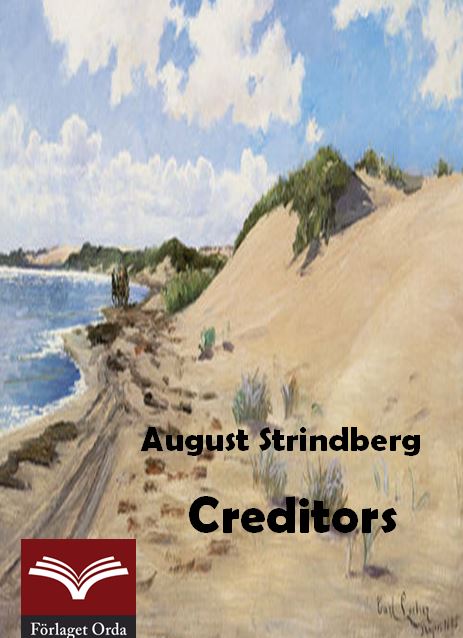
To the right of the door stands a table with newspapers on it. There is a chair on the left side of the stage. To the right of the table stands a sofa. A door on the right leads to an adjoining room.) (ADOLPH and GUSTAV, the latter seated on the sofa by the table to the right.) ADOLPH. [At work on a wax figure on a miniature modelling stand; his crutches are placed beside him]--and for all this I have to thank you! GUSTAV. [Smoking a cigar] Oh, nonsense! ADOLPH.
Why, certainly! During the first days after my wife had gone, I lay helpless on a sofa and did nothing but long for her. It was as if she had taken away my crutches with her, so that I couldn't move from the spot. When I had slept a couple of days, I seemed to come to, and began to pull myself together. My head calmed down after having been working feverishly. Old thoughts from days gone by bobbed up again. The desire to work and the instinct for creation came back.
My eyes recovered their faculty of quick and straight vision--and then you showed up. GUSTAV. I admit you were in a miserable condition when I first met you, and you had to use your crutches when you walked, but this is not to say that my presence has been the cause of your recovery. You needed a rest, and you had a craving for masculine company. ADOLPH. Oh, that's true enough, like everything you say.
Next pageFont size:
Interval:
Bookmark:
Similar books «Creditors»
Look at similar books to Creditors. We have selected literature similar in name and meaning in the hope of providing readers with more options to find new, interesting, not yet read works.
Discussion, reviews of the book Creditors and just readers' own opinions. Leave your comments, write what you think about the work, its meaning or the main characters. Specify what exactly you liked and what you didn't like, and why you think so.

